Women's Rights
Halifax’s second Women’s March encourages people to ‘Walk the Talk’ for all women
Counter rally included to support trans women, black, Indigenous and other women of colour
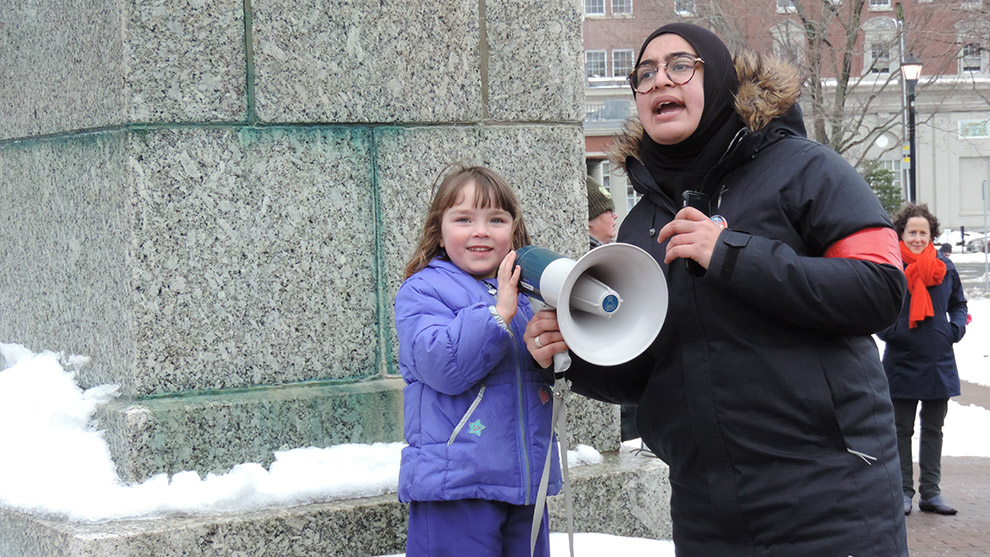
caption
"We march for the next generation," says Masuma Asad Khan, student union vice-president at Dalhousie University.Hundreds attended the second annual Women’s March outside Halifax City Hall on Saturday. Host Rana Zaman welcomed and introduced a counter rally, as the group marched through Grand Parade to support trans women, Indigenous, black and other women of colour.
Rebecca Thomas, Halifax Poet Laureate, addressed it as she spoke to the crowd.
“For those who are marching, I gently ask that you think of those who are not here today,” Thomas said. “Not for the ones who slept in or felt they had better plans, but those who don’t necessarily feel safe in these spaces. This is for those pussies that are not pink, or those who are born without them.” Related stories
At the main event, the crowd was full of smiles as they sang, watched Hindi dancing and heard Chinese drumming. Poets El Jones and Thomas brought audience members to tears as they spoke about gender-based violence.
Indigenous Elder Geri Musqua-LeBlanc, trans woman Carolyn Davis and Liane Tessier gave personal accounts of discrimination in Halifax. Tessier recently settled a 12-year case about systemic gender discrimination at the Halifax fire department.
“When men speak out, they are seen as heroes and game changers. People call them assertive, powerful and strong,” Tessier told the audience. “When women speak out we are seen as bitches and troublemakers. People call us hysterical, violent, mentally unstable or too sensitive.”
Saturday marks a year since U.S. President Donald Trump’s inauguration. The first march was a reaction to his behaviour and policies.
In her address to the crowd Saturday, Zaman encouraged people at the rally to attend a second gathering, called Walking the Talk, at the Cornwallis statue in Cornwallis Square.
A reaction to threatening and degrading comments about trans women made on the Halifax Women’s March Facebook page, Walking the Talk was organized for greater inclusion of black, Indigenous, trans, queer, two-spirited and other women of colour.
During both events, hundreds of men and women and children showed their support. Here are a few of them.
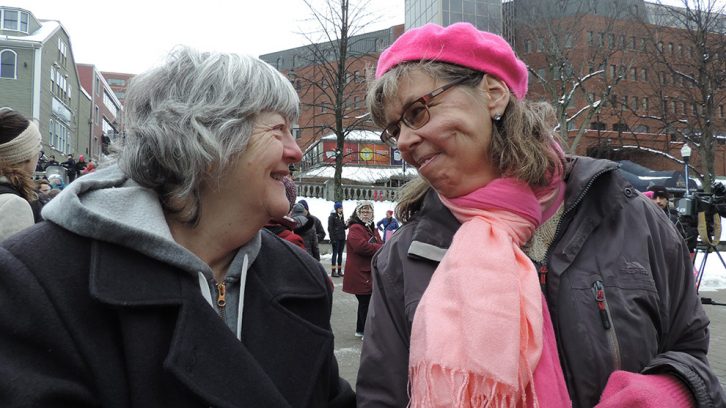
caption
Amy Moonshadow (right) attended the march to represent disabled women.Amy Moonshadow attended with her best friend to support women with disabilities. Moonshadow said like most disabled women, “she has been discriminated against her whole life.”
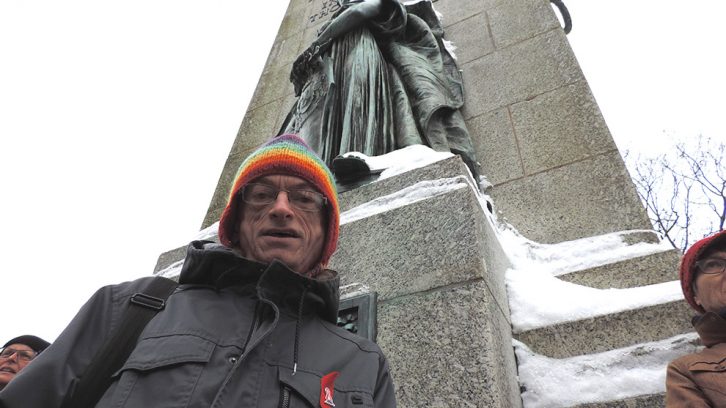
caption
Eric Smith believes Trump is trying to ‘make America white again,” which he said needs to stop.Eric Smith has been a feminist since the 1970s. Growing up with three younger sisters, he said, “I always saw them not having the advantages I had.”
Now, a gay rights and HIV activist who also supports women’s equality, Smith is not happy with the way the Trump presidency is treating women and marginalized groups.
“If there is anything you can say positive about the Trump presidency, it’s sparked that activism again,” he said.
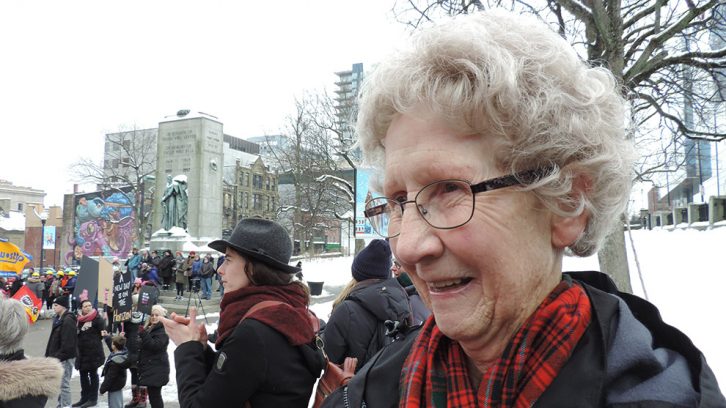
caption
Shirley Dean said she will continue to support the women’s movement at the rally.Shirley Dean has supported the women’s movement since the 1960s. She said movements like the march show “women have as much to contribute as anybody else, and deserved to be paid the same and not to be treated as objects.”

caption
Kim Sorensen (left) and her daughter Gabby said they attended the event to exercise their right to protest.Kim Sorensen said she came to Saturday’s event because her daughter, Gabby, turned her into an activist.
“I think we have a legacy to all women to continue the fight and to do whatever we can … to make it right,” said Sorensen, adding that marching is important for the younger generation. “I hoped they wouldn’t have to do this shit, but they do.”
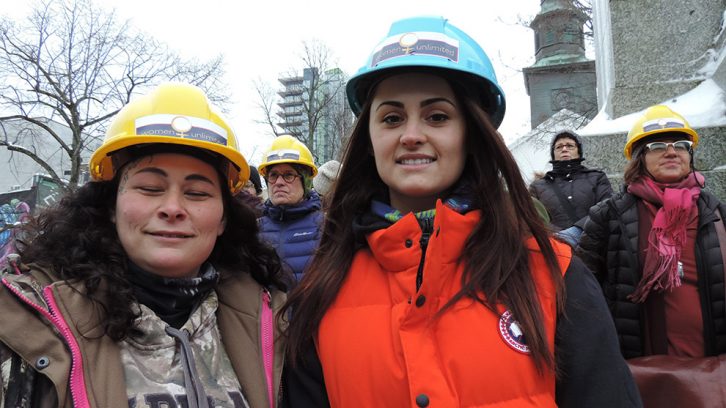
caption
Catherine Marriott (right) and Barbie Jessome (left) of Women Unlimited are unhappy how women are treated in the trades.Catherine Marriott attended the march with Women Unlimited, an organization in Nova Scotia that promotes the full participation of women in trades and technology.
“It can be hard and I want to make that known, and want to support those who go through the same thing,” she said.
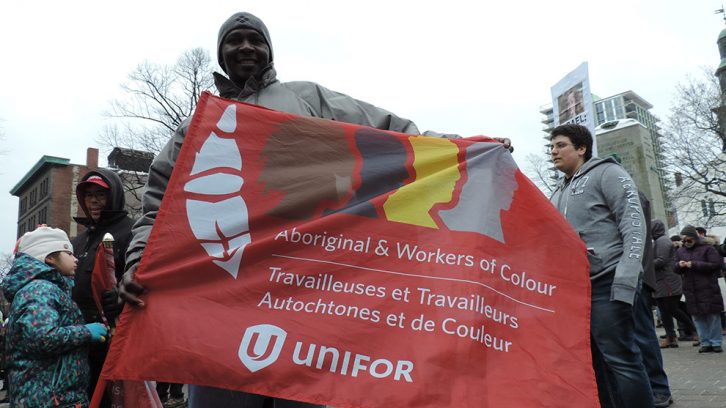
caption
Ayamba Ramba said he was marching for equality and justice.Ayamba Ramba said he was marching for equality and justice, as he is unhappy with how female co-workers are treated at his workplace. He said he supports everything mentioned at the march, like equality and justice.
“I see this in my daily life, so it’s good to come together and support for women’s cause,” he said.
Walking the Talk for intersectional women
The crowd grew at Walking the Talk as organizers Masuma Asad Khan, Jayde Byard Peek, Katie George-Jim and Rebecca Moore gave testimonies.
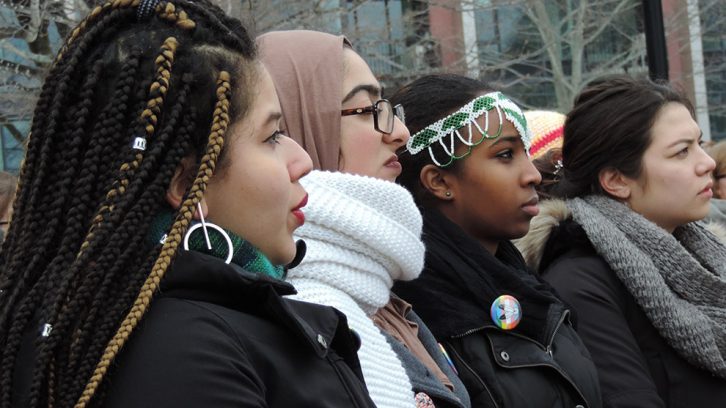
caption
Aisha Abawajy (third from front) said “we don’t need the hate, we don’t need to be told to take a step back.”Aisha Abawajy attended Saturday’s events to support those who are “always marginalized” at women’s marches.
“We cannot separate transgender, black, Indigenous and other women of colour because we are also women and without everyone together, we cannot move forward,” said Abawajy.
“These types of marches make it loud and proud that we are here, and we love and support each other, and people who love and support us; we with love and support them and those who don’t need to move aside and let us take up our space.”
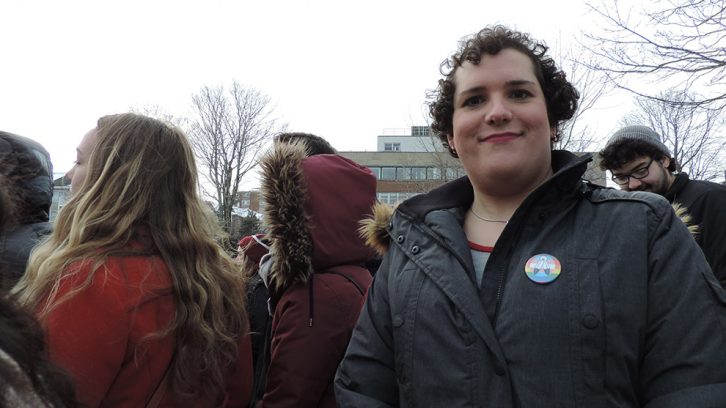
caption
Kaylee Fox was “impressed by the positivity of both events.”Kaylee Fox went to both rallies to support trans women.
“I have suffered a lot of discrimination in my life. I have been told to shut up so many times by people I both love and live around,” she said. “Everyone needs a voice and I’m willing to give mine.”
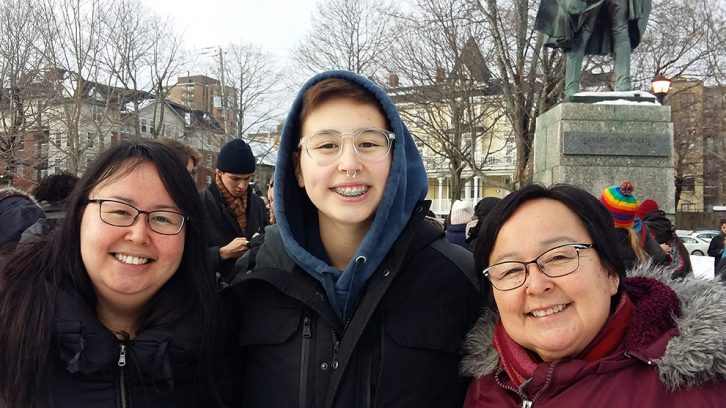
caption
Ethan Palliser-Nicolas (middle), with his mother Frances (left) and grandmother Teresa (right).Ethan Palliser-Nicolas was at the marches with his mother Frances and grandmother Teresa. He said he was there because he is Indigenous and transgender.
“(Events like Walking the Talk) are important to me for noticing and recognizing the LGBT and Indigenous community,” he said.
About the author

Karli Zschogner
Karli Zschogner is part Nova Scotian and recently moved to Halifax for Journalism at the University of King's College. After her Bachelors in...
